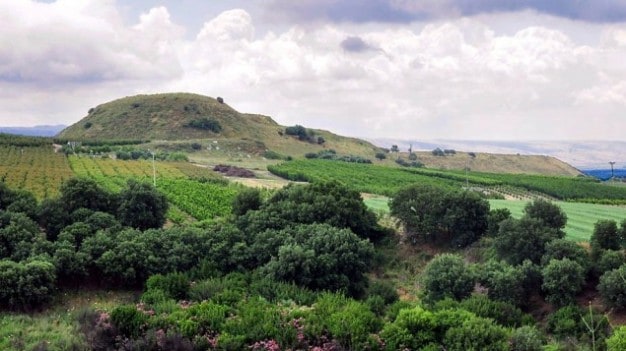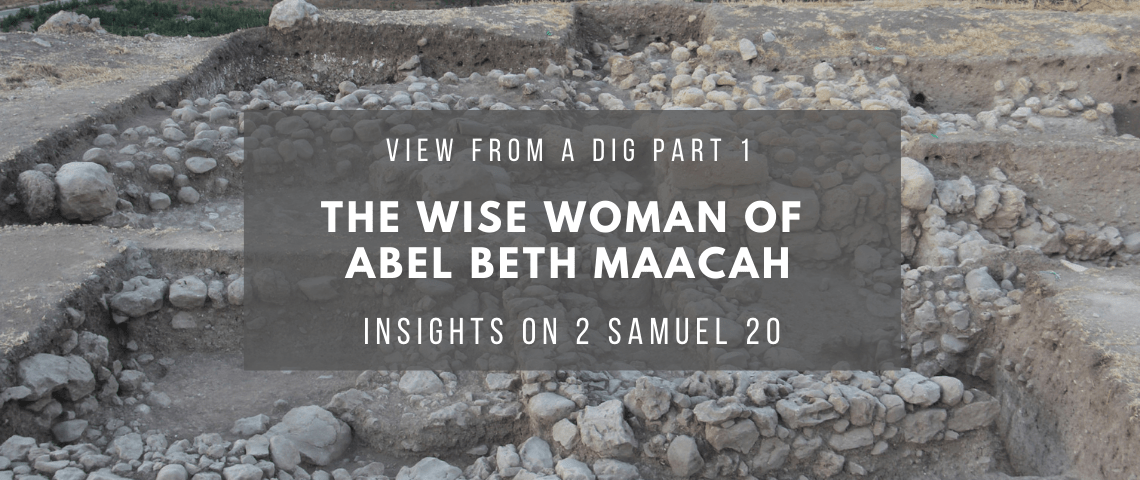I don’t remember being aware of the Wise Woman of Abel Beth Maacah until a friend sent me an article connecting her story to an archaeological site in Israel that we were about to visit. I’m sure I had never heard any sermons about this biblical woman, who successfully confronted a top military commander and ended a siege on her city.
Here’s a brief summary of the story as recorded in 2 Samuel 20
David’s armies have been fighting to put down the last faction of a widespread rebellion. The remaining rebel leader, Sheba, who has called for the northern tribes to secede, flees with his men to Abel Beth Maacah, a northern outpost of Israel. David’s ruthless general, Joab, goes after them and a siege of the fortified city ensues.
As the troops are battering the walls, a character identified only as a “wise woman” appears and demands to speak to Joab. Surprisingly, the battle stops. She reproaches Joab with some skillful arguments. They negotiate, and she agrees to hand Sheba over in return for Joab’s peaceful withdrawal. She promises, “His head shall be thrown over the wall to you” and that is exactly what happens. Sheba is beheaded, and the troops disperse.
I was hooked and wanted to know more.
What prompted this woman to go to the wall in the middle of a battle and confront her nation’s chief military commander? Why would he stop and listen to her; never mind negotiate? And what was it about her that caused the residents to follow her orders?
By the time a group of us headed for Israel to participate in a preliminary archaeological survey of Abel Beth Maacah¹, I had a stack of reading material packed in my carry-on bag that I hoped might provide some answers to my questions. Here are a few things I learned from my research.
The “Wise Woman” descriptor suggests a leadership role with political authority.
Some scholars believe the “Wise Woman” title represented a civic leadership role that existed during the period of the judges and early monarchy. It appears this role was filled by women known for wise judgment, rhetorical skills, and the ability to negotiate difficult situations (see Camp, Frymer-Kensky, and Youngblood²). The story of this particular wise woman’s approach to a critical situation (and Joab’s response) gives some clues about this wise woman tradition. The decision by English translators to change this title to “a woman who was wise” or a “wise woman” (no caps) obscures this possibility.
The Wise Woman’s approach
The Wise Woman of Abel Beth Maacah acted alone to intervene in a crisis, commanding the attention of the attacking forces. She took control of the situation, quickly establishing her credibility and authority, and reminding Joab of the city’s importance to Israel. She used wisdom and logic to challenge Joab’s thinking and redirect him to a better solution. We are told she went back to the people with her “wise advice” and mobilized them to follow through with her promise to hand over the rebel leader. In addition to this account, 2 Samuel 14 records the story of another wise woman, the Wise Woman of Tekoa, and Deborah may have held the same title before being named Judge over Israel. So there is some precedent suggesting this role was not unusual.
Joab’s reproach
Joab had called on the Wise Woman of Tekoa for help with a difficult problem earlier (2 Samuel 14), so we know he was aware of the wise woman tradition. This may be why he responded immediately to the demand to “listen!” (20:16). There was no hesitation despite the danger of approaching the wall of a city under siege, suggesting he recognized the wise woman’s authority to initiate a “cease-fire”. His willingness to negotiate (not his typical response to difficult situations) showed he believed she was officially representing the city residents. The end result is that he submits to her authority and withdraws his troops.
One has to wonder why Joab would bother to negotiate at all, regardless of who appeared on the wall. This was a man known for violence – he had recently killed his own cousin in cold blood to advance his own leadership (2 Samuel 20:10). But if this wise woman had recognized authority and a widespread reputation, the story doesn’t seem so absurd after all.

As we stood on the hill at Abel Beth Maacah, founding directors Dr. Nava Panitz-Cohen (Hebrew University of Jerusalem) and Dr. Bob Mullins (Azusa Pacific University) pointed out where the siege ramp might have been constructed. As I imagined the scene playing out before me, it dawned on me that the excavations at Abel Beth Maacah offer the possibility of discovering more about this role of the Wise Woman in Jewish tradition. There have already been several significant finds that have caused the archaeology community to stand up and take notice. (Biblical Archaeology Society, Huffington Post, Fox News, The Times of Israel)
Whether or not the role of the Wise Woman was formal or informal, it is yet another example of the “exception proving the rule” – of God using women to accomplish his purposes in spite of the restrictions of a patriarchal society.
Notes
¹ The excavations of Tel Abel Beth Maacah began as a joint venture of Azusa Pacific University and Hebrew University.
² This is a very brief overview of the scholarship on the Wise Woman tradition. For further study I suggest these sources:
Panitz-Cohen, Nava and Naama Yaholam Mack. The Wise Woman of Abel Beth Maacah. Biblical Archaeology Review (2019), 26-33.
Camp, C. V. (1981). The Wise Women of 2 Samuel: A Role Model for Women in Early Israel. Catholic Biblical Quarterly 43, 14–29.
Frymer-Kensky, T. (2002). Reading the Women of the Bible. New York: Schocken Books.
Youngblood, Ronald F. (2010). The Expositor’s Bible Commentary (Book 3). Section on 2 Samuel 20. Grand Rapids: Zondervan.
In Part 2 of this series Dr. Nava Panitz-Cohen, Co-Director of the excavations at Abel Beth Maacah, shares reflections on her experiences as a woman dig director in a male-dominated field.
Graphic Credit: Katie Hickman. Photos courtesy of Abel Beth Maacah excavations.




14 responses to “Uncovering the Wise Woman of Abel Beth Maacah”
Fascinating! I somehow never got around to reading this story.
I hadn’t thought of it in terms of a ‘wise woman tradition’, but it is interesting. This has always been one of the funnier moments for me in Scripture, when Joab gets dressed down by some random woman like a grandmother rebuking a child.
A few other crazy women stories, aside from Anne’s list, are:
–Jehosheba saving her son from a genocide
–the woman who threw a boulder over the wall and and smashed a guy
–the women in…someplace in the first five books in which a group of sisters insist that since they have no heir they should be allowed to inherit (and it goes into the Law as a result, which doesn’t sound like much at first, but yeah)
And I feel like there’s another, but I can’t place it right this second.
Thanks, Kaci. I love the list that’s coming together – these women were not exactly June Cleaver! I love the story you mentioned about the five daughters of Zelophehad. The story of how these remarkable young women advocated so that the inheritance laws were actually changed to be more favorable for women is found in Numbers 27.
I think the closest to June Cleaver was Jael, who feigned hospitality as a lure to kill the enemy, or Abigail, who, again, stopped over thirty hot-headed, angry men with…. *drumroll* breakfast.
Imagine June Cleaver on a horse with an army of servants toting trays rushing a ticked-off Robin Hood or offering a glass of milk with one hand and holding a stake behind her back with the other.
…that about sums it up.
Addendum: And thanks for the reference. I’m bad at putting “passage” and “reference” together.
Last summer I was a volunteer at this dig site and I got to work with Dr. Nava Cohen and Dr. Bob Mullins. I look forward to Nava’s post. This story is indeed intriguing. It goes to show that women do make effective leaders.
How fun, Rebekah! I was amazed at how much was accomplished last summer – amazing, really.
Fascinating story, Gail!!
I’ve heard of her mentioned once, by Lee Grady at this years CBE conference. It was in the context of his message “Jael’s lethal weapon” and he pointed out that there were a number of incidents in the OT where women do damage to heads:
(1) Gene 3:15: the woman would crush the serpent’s head
(2) Jael puts a tent peg in Sisera’s head
(3) the unnamed woman in your post
(4) and Esther being responsible for the hanging of Hamaan.
Interesting, eh? ~ there’s my Canadian signature 🙂
Looking forward to hearing more discoveries surrounding the dig.
SO INTERESTING! Thanks, Anne 🙂
Thanks for this & the references – this woman had slipped me by.
‘Women do damage to heads’ – wow, now there’s a thought !… what do all these heads have in common?
The wisdom and authority of this OT Wise Woman puts me in mind of the NT ‘gift of wisdom’ and the spiritual authority that comes from being led by the Spirit.
Yes, she’s like Abigail who prevented a massacre and prophesied to David, and Deborah who had civic authority – presumably based on her wisdom – and brought the word of the Lord to Barak. I love the protectiveness of these women’s hearts – ‘mothers’ (perhaps not literally) in Israel who acted with bravery to defend their people.
They stopped men making mistakes and exhorted them to proper action. Good to have on a leadership team!
This is the first I’ve heard about these wise women (maybe it’s time to head back into the OT?). Thanks for a great article. I am fascinated and excited to know more about them too!